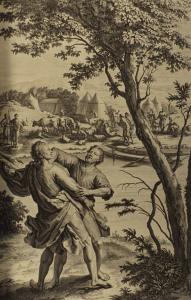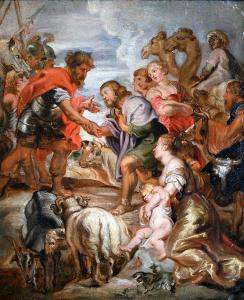 I have been at the top of the social heap for most of my life. I am white, male, heterosexual, and each of those realities has led me to enormous privilege. All I ever needed to do was to work hard, be moderately clever, and the goodies of the world would flow for me. Surely, I thought, anyone could follow my game plan—work hard, be clever, and all would be well.
I have been at the top of the social heap for most of my life. I am white, male, heterosexual, and each of those realities has led me to enormous privilege. All I ever needed to do was to work hard, be moderately clever, and the goodies of the world would flow for me. Surely, I thought, anyone could follow my game plan—work hard, be clever, and all would be well.
As I look at the Bible, I can easily see that Jacob is a man after my own heart. Well, he was not white, but he was the right color for his time, the dominant color, and he was born at the top of the social heap as that was determined some 3000 years ago or so. And he was on the top of the heap because his own mother had that fact straight from the mouth of God. Here is how his story goes.
Isaac and Rebekah simply could not have children. Like Abraham and Sarah before them the gift of a family was long delayed, until finally, at long last, Rebekah became pregnant. Unfortunately, that was not the end of her trouble, but only the beginning. The pregnancy was difficult, and became so painful and scary that Rebekah felt the need to consult the local oracle in the attempt to find out what was wrong. And the oracle replied, “Two nations are in your womb” (no wonder the pregnancy was hard!), and two peoples are there.” But to add to her confusion, the oracle went on to warn her that the younger of her two babies would in fact be the master of the older. It was traditionally not so; the eldest always received the best of the family’s promises and blessings. But it was not to be this way for Rebekah and Isaac.
The day arrived for the birth, and the first of two boys emerged from Rebekah covered head to toe with hair. So, they called him Esau, or “Hairy” in the language. And the second boy followed quickly, so quickly that he was grabbing onto Hairy’s heel, so they named him Jacob, or “Grabber” in the language. No name was ever bestowed that was more apt than Grabber for that boy.
All too soon, the twins grew up. These twins were hardly identical. Hairy was a wild boy, big, burly, an avid hunter, who rushed alone into the wilderness searching for game in order to cook it just so for Isaac, his father. Meanwhile, Grabber, a Momma’s boy, hung around the tents, cleaning and cooking prize-winning Sinai stew, for which he won blue ribbons aplenty at the local fairs. Grabber was more slight physically than his brother but with a very agile mind. One day, after a failed hunt, Hairy burst into Grabber’s tent, enticed by the smell of another pot of that succulent stew. “Give me some of that red stuff,” he shouted, suggesting that he cared little whether or not Grabber’s stew was a gastronomic marvel or not. He was starving! Now if Grabber had been a good brother, he might have handed a bowl to his famished brother without comment, but Grabber saw an opportunity in the situation; Grabber was always looking for a good opportunity.
“Not so fast, my brother,” he said. “Of course, you may have a bowl of my stew, but first, sell me your birthright.” What Grabber is demanding is the right of the first born, the right to the best of the property, the land, the livestock, the wealth. “What good is that birthright to me if I starve to death,” howled Hairy? Why not? “Swear to me first,” purred Grabber, wanting to be sure that dolt Hairy really was ready to sell his birthright for a bowl of stew. So Hairy swore the oath, sat, ate, belched and left. Thus, we are told, did Hairy despise his birthright. What an idiot! Selling his patrimony for a bowl of stew! Little wonder that the history of Israel is marked by the patriarchs Abraham Isaac, and Grabber, and not Abraham, Isaac, and Hairy
Soon after, father Isaac grew very old and close to death. He asked his favorite, Hairy, to hunt game and to cook his favorite food, and bring it to him in order that Isaac might bestow on Hairy the blessing of the patriarchs. As firstborn, it was his due. Isaac knew nothing of the sale of Hairy’s birthright for a bowl of Grabber’s stew. Rebekah was listening to her husband’s request of their firstborn, and quickly called her favorite, Grabber. She demanded that he act by rushing to the animal stall, selecting a young and tender calf, bringing it to her so that she might cook food such as Isaac loved. Then, she plotted, Grabber could take the food into the ailing and blind Isaac, and trick him into giving Grabber the blessing instead of that dolt Hairy. “But,” Grabber whined, “Hairy is, well, hairy, and I am smooth as a billiard ball. Dad will feel me and know right away that I am not Hairy! We’ll get caught!” “I have that all figured out,” says Rebekah. “We will take some animal skins and put them on your arms and neck, and when Isaac touches you he really will think you are Hairy. Now, get going!”
The plan works to perfection. Grabber takes the food from his mother, walks carefully into Isaac’s tent and announces, “Here is the food you requested, father.” “Who are you?” Isaac asks suspiciously. “Why, I am Hairy, your firstborn. Sit up now and eat of my game and bless me before you die.” “How did you get back so quickly from the hunt, my son?” “Well, God gave me success,” lies Grabber. In fact, it was Rebekah your wife, but he hardly says that. “Are you really my son, Hairy?” questions Isaac. “Come close so I may touch you.” So Grabber came near, and Isaac reached out to touch him. “Well,” he sighs, “the voice is Grabber’s voice, but the hands are Hairy’s.” And then he blessed him. More than a few rabbis over the centuries suggest that Isaac is in this scene not fooled by Rebekah and Grabber. He knows very well, they say, that the blessing must go to Grabber, despite the obvious attempt at trickery. The blessing simply cannot be given to the idiot Hairy, and thus Isaac only goes along with the scheme in order to give the blessing to the boy who must have it. Whether that is true or not, the fact is that both birthright and now blessing have been given to the clever Grabber.
After Hairy rushes into the tent with the food his father requested, he learns that Grabber has stolen his blessing away. He is enraged and vows that after Isaac’s death, he will kill his too clever brother. Once again, however, Rebekah is listening at the tent flap, and warns Grabber that Hairy is bent on his murder. She urges him to flee quickly back to the home country of Haran to escape his rampaging brother. And so he does. During the journey, Grabber finds himself alone near a strange mountain, and, using a rock for a pillow, he dreams an odd dream. He sees messengers of God ascending and descending a ladder, joining earth and the sky. At the top of the ladder, he sees God who gives to him the familiar blessing of the patriarchs, the promise of numerous offspring, and the certainty of God’s presence and protection for the rest of his days. Grabber awakes, proclaiming, “Surely God was in this place, and I did not know it!” And then he makes a vow; the vow is very like Grabber! “If God will be with me, giving me bread to eat and clothes to wear, and bringing me back to my land, then I say that God can be my God. Then I will give God a tenth of all I have.” Well, thank you very much! Grabber bargains with God right after God has given to him, without question or rebuke, the full blessing of God. Is not Grabber named well!
Grabber then finds his way to Haran, and after 20 long years there, marries both Leah and Rachel, produces 11 sons and a daughter, and tricks his uncle Laban out of the very best of his livestock. Grabber becomes rich and finally leaves Haran for home. Still, he has a big problem. Hairy, and his rage, are still to be reckoned with. So the clever Grabber plots and plans, as he always does. He hears that Hairy is intent on meeting him, and in the attempt to assuage Hairy’s fury, Grabber sends waves of gifts to him, from oxen to donkeys, to sheep, to male and female slaves, in the attempt to cool him off. Finally, he comes to the ford of the Jabbok River, and sends his entire retinue across the river. And Grabber is now alone.
Out of the dark, he is jumped by a man, and the two of them wrestle until daybreak. “Let me go,” shouts the man; “the day is breaking!” Who is this, Dracula, who must avoid sunlight? “I will not let you go until you bless me,” counters Grabber! “What is your name?” asks the man. “Grabber.” “You will no longer be called Grabber; your name is now Israel, because you have wrestled with God and with human beings, and you have won!” And with that the man disappears. And Grabber says, “I have seen God face to face, and I am still alive!” We know this famous scene as Jacob wrestling with God, but it is only Jacob, the Bible’s consummate liar, who says that. Why should we believe him? I think Grabber’s wrestling partner was in fact himself, and his claim that he has defeated both God and self is not fully true. Only when he faces his brother will the truth be seen.
As Grabber crosses the stream, rejoining his family, he is told that Hairy has been seen on a mountain nearby, and he has 400 men with him. Grabber now realizes that the jig is up. His massive bribe has not worked, and Hairy is bent on revenge. So he divides his company into parts, left and right, perhaps hoping that Hairy’s onslaught might spare some at least. He puts his beloved Rachel in the back of the crowd, while he himself heads to the front, bowing seven times in abject terror, as he spies Hairy running down the mountain toward him. And then comes the great surprise. Hairy pulls Grabber off the ground and wraps him into a great bear hug, and, we are told, “They wept.” I daresay they are weeping for two very different reasons! Hairy, miraculously, seems very glad to see his archenemy, Grabber, while Grabber is just very happy to be alive! “What was all that stuff you sent to me?” asks Hairy. “I was looking for favor from my Lord,” whines Grabber. “ I have plenty, my brother; keep what you have for yourself.” “No, my Lord,” (Grabber never calls Hairy brother in the scene), please take my gifts.” Grabber only knows a world where you get what you pay for, where cleverness and trickery pay, where genuine gifts are not really to be expected. Grabber then says, “Seeing your face is just like seeing the face of God, since you have received me with such favor.”
Exactly! Grabber did not really see the face of God at the wrestling match at Jabbok. Only in the face of Hairy did he really see the face of God. We all need desperately to find the face of Hairy in our own lives. And just where do we find Esau’s face? Esau, we remember, was the fool who sold everything for a bowl of stew; why would we ever need him? For us Jacobs, who have always had it our way in the world, who have educated and insulated ourselves in a world we have created, a world where white triumphs, where success is assured for some, but denied to the many, we need our Esaus. When the virus strikes us, and reveals inequalities we did not see clearly before, there is Esau, the unexpected revealer of God. When protests break out against the cruelties of brutality against people of color, there is Esau, the unexpected revealer of God, calling us out of our cocoons of privilege, urging us to confront the easy world we have made, demanding that we see things in a new light. We, the privileged, need Esau to bring us unexpected revelation from God to break us free from our pockets of ease and comfort and to push us into the light of truth and hope. Now at this place and in our time Esau is grabbing us in a huge embrace, forcing from us tears of hope, and bidding us to wake up to the actions of the God of surprise, who calls us again to lives of love and justice.
(Images from Wikimedia Commons)











